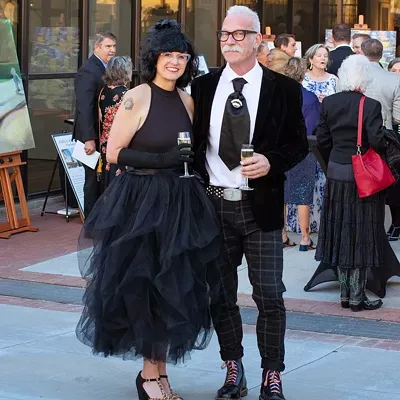In a play called Burn This, it would not be unreasonable to expect a display of emotional fireworks. By summoning the image of fire, the title calls forth our associations with that charged word: anger; aggression; raging passion; sex and sensuality; destruction. Whether a conflagration, a smolder or a simmer—or all of the above—we expect heat. And, possibly, light.
Winding Road Theater Ensemble is presenting Lanford Wilson's 1987 play as the last show of its regular season. In the Glen Coffman-directed piece, there is a hefty dose of anger but, although the plot requires it, very little true passion and sexual heat. Consequently, there is very little light.
In fact, we are pretty much left in the dark. We ultimately aren't able to tease out the real sense of the piece because we have a hard time liking these characters, and so are never really able to connect with them. In the end, we don't really care.
Three friends have been living together in a New York apartment. One of them, Robbie, a gifted dancer, has been killed in a freak boating accident with his lover, Dom. Roommate Anna (Emilee Foster), Robbie's dance partner and would-be choreographer, now is left in the apartment with Larry (Steve Wood), a single gay guy who works in advertising. As the play opens, Anna has just returned from Robbie's funeral in the Midwest and shares her odd experience there with Larry and Burton (Patrick Baum, playing a yawner of a man, a rich and successful writer of sci-fi screenplays who is Anna's boyfriend, although they never feel genuinely connected). From Anna, we understand that she and Robbie were creative soulmates, and her loss is more than the loss of a close friend. Burton leaves, and Anna and Larry retire.
In the middle of the night, there comes such an uncompromising pounding on the door, accompanied by very loud shouts, that it seems like a home invasion. And in a way it is. The pounding madman identifies himself as Robbie's brother, Jimmy (Christopher Johnson) who is there to collect Robbie's things. Anna, who met Jimmy at the funeral, lets him in although it's a bit difficult to understand why she might not be inclined to keep such a raging madman on the other side of the door. This is one of the first of many mysteries involving why these characters do what they do.
Jimmy—who is known as Pale, ostensibly because of his fondness for a certain grade of cognac, but whose nickname is an ironic counter to his fiery nature—consumes the room with his drunken and utterly coked-out outburst, which goes on and on with hardly an acknowledgement that Anna is in the room. Johnson throws himself fully into this most unpleasant character's tirade, in which from time to time he will change speeds and say something actually quite funny, or maybe even (almost) sweet. He is a most unnerving character, wild, brutish, and unpleasant, and his rude invasiveness is horrifying and mystifying in almost equal measures. Perhaps more so is Anna's response. She seems to be able to forgive his utter lack of respect, overlook his anger and irreverence and recognize his grief. So she sleeps with him. Yep.
What follows is a rather common story of a love triangle. Anna finally has enough of Pale and returns to Burton. But in a New Year's Eve showdown, her allegiance is tested after a meeting between a drunken Pale and a tuxedoed Burton turns violent. Whom does she embrace?
This is not one of Wilson's better plays. Although he is among the finest of modern American playwrights, Burn This offers neither the meat nor the heart of many of his others. He seems to be dancing around several issues—overwhelming loss and the inability to deal with it; loneliness; the challenges to the creative spirit in an inhospitable world; the complexities and mysteries of attraction and love—but he has put these issues in the hands of characters, as administered here, at least, without the depth and the credibility to see them through, in a story that they are ill-equipped to serve.
The only way the union of Pale and Anna makes much sense is if they have an overwhelming, fiery sexual attraction palpable enough to consume them and the pain of their losses. If the information needed for the actors and a director to discover such a relationship convincingly is contained in Wilson's script, it is most assuredly not present here despite some laudable efforts. Our ears burn with Pale's diatribes, but there are no combustible feelings between Anna and Pale.
There is also a lack of focus and shape in the way the story plays out. Whatever issues Wilson intended to explore are not clearly illuminated. Generally, the characters do not give us a credible picture of the genuine emotional strengths of their relationships, or lack of them. The character of Larry is a smart-mouthed, brightly quipping homosexual who is part traffic director and part wise observer. Curiously, although AIDS was decimating the gay community in 1987, Wilson never refers to it. However, in the midst of these oddly coupling friends, Larry is single.
Wilson creates a most curious character in Pale (the part was written for John Malkovich). Beyond that, a story that should shimmer with sensuality and simmer with heat fails to ignite.







